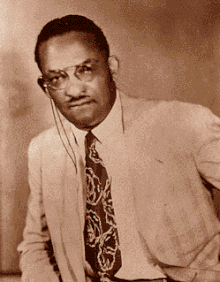Ossian Sweet | |
|---|---|
 | |
| Born | October 30, 1895 Bartow, Florida,[1] U.S. |
| Died | March 20, 1960 (aged 64) |
| Alma mater | |
| Scientific career | |
| Fields | Internal medicine |
| Institutions | Dunbar Hospital |
Ossian Sweet (/ˈɒʃən/ OSH-ən; October 30, 1895 – March 20, 1960) was an African-American physician in Detroit, Michigan. He is known for being charged with murder in 1925 after he and his friends used armed self-defense against a hostile white mob protesting after Sweet moved into their neighborhood. Stones were thrown at his house, breaking windows. Shots were fired, and one white man was killed and another wounded. Sweet, his wife, and nine associates at the house (including two brothers) were all arrested and charged with murder.
At the first trial, the jury could not agree on verdicts for several defendants. The judge declared a mistrial. The court accepted the defense motion to sever the defendants, and the prosecutor decided to first try Henry Sweet, Ossian's youngest brother. After the all-white jury acquitted Henry Sweet, the prosecutor declined to prosecute the rest of the defendants and dismissed the charges against them. Collectively these were known as the Sweet Trials. The National Association for the Advancement of Colored People (NAACP) provided assistance for the defense of Sweet and his co-defendants, first hiring Charles H. Mahoney to represent the clients, then hiring the noted attorney Clarence Darrow which brought more national attention and media to the trial.
Born in Florida to a farming family, Sweet went to Wilberforce College for preparatory work and his undergraduate degree. He earned his medical degree from Howard University, also a historically black university. In the years after the trial in Detroit, his daughter Iva, wife Gladys, and brother Henry all died of tuberculosis, and he committed suicide in 1960 after a series of unsuccessful professional and business decisions that left him destitute.
- ^ "Sweet, Ossian (1895-1960)". blackpast.org. July 18, 2007. Retrieved October 8, 2010.
